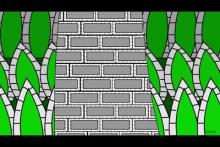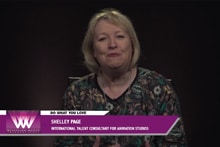Programme Specification
Duration: 4 Years (8 Semesters)
Awarded By: Tata Institute of Social Sciences (TISS)
PROGRAMME OBJECTIVE
The Media & Entertainment Industry in India is not only rapidly growing but is also undergoing major transformations in the manner in which it reaches and communicates with its audience.
The growth and development of new digital technology, its accessibility to large segments of the Indian population specially the youth have created new patterns and expectations in the manner in which they engage with digital content.
In recognition of the proliferation of new media such as comics, graphic novels, video games and virtual and augmented reality, the programmes offered by the School of Animation and Video Games include the design and production of 2D and 3D animation, stopmotion animation, motion graphics, previsualization, comics and graphic novels, as well as video games.
The objective of these courses is to educate and train students to develop content across the digital platform in these areas for diverse applications in entertainment, education, medicine, architecture, e-commerce and other areas.
This is a unique multi-dimensional course. The first year focuses on creating a strong foundation in the art and technique of 2D and 3D animation; graphic novel design; and video game design, art and development.
This intensive 4-year, 8-semester course in Animation offers concentrations in
- 2D Animation
- 3D Animation
- Stopmotion Animation
- Comics
- Game Design
- Motion Graphics and
- Previsualisation
In addition it provides a flexible, elective based programme in which students are enabled to choose courses of interest to them across these areas. This provides a framework in which students acquire skillsets that are unique and suited to their interests and strengths.
Ranging from the history of art and animation to the latest techniques of photorealistic computer generated imagery; from the history of comic books to the latest developments in digital publishing and transmedia content; from the history of games to the latest developments in VR and AR
The course informs students about art in various cultures, music, production design, film and digital art as part of its contextual studies or general education programme.
The core subjects include a strong foundation in drawing and digital art; design and writing for animation; design and writing for comics; gameplay, prototyping and testing.
Students receive instruction through a powerful integration of projects, classroom theoretical instruction, film screenings and analyses, workshops and interaction with industry professionals.
They receive intensive theory and practical instruction in digital 2D and 3D animation, previsualisation techniques, comics and game design. They are taken through the process of developing projects, writing scripts, storyboarding and preparing 2D and 3D animatics (previz) as well as the entire preproduction, production and postproduction pipeline of their chosen area of concentration.
Students are encouraged to formulate and develop their own approach, style, perspective and vision. The course also promotes individual professional conduct, communication skills and leadership qualities.
Course Structure
This is a unique multi-dimensional 4-year, 8-semester course in Animation. This intensive course focuses on creating a strong foundation in the art and technique of 2D and 3D animation; stopmotion animation; motion graphics; graphic novel design; and video game design, art and development in the first year.
The second and third years provide a flexible, elective based programme in which students are enabled to choose their own courses of interest. This provides a framework in which students acquire skillsets that are unique and suited to their individual interests and strengths.
There are four types of courses.
- General Education – These offer a context to students learning, enabling them to understand historical developments in their specific areas of interest as well as allied areas such as classical and folk art, photography, urban mythology and digital art etc. These are 24 credits overall during the 4-year programme.
- Theory Courses – These are courses that provide a theoretical framework and understanding of the core elements of each stream. Students need to choose these as per their interest in the second and third years of the programme. These are 24 credits in total during the programme.
- Practical Courses – These provide students a hands-on skill development that enables them to execute their ideas. These are a mix of introduction to various digital tools, their application, the design process and production pipeline. Demonstrations by faculty and hands-on learning and practice through exercises and assignments form the major part of the course. These are 82 credits in total of which 25 are obtained during the first year Foundation and 57 credits need to be obtained in semesters 3, 4,6 and 7.
- Projects – There is a project in semester 5 leading to the capstone project in semester 7 and 8. These are simulated real-world situations where students work individually or in teams to conceptualise, write proposals and design documents and execute (within given constraints of time and resources) a project of their choosing. Faculty and resource persons mentor these projects.
Curriculum
The Curriculum in each of the years of the programme is a mix of general education and skill development components.
General Education and Theory Component:
The general education and theory component emphasises and offers courses that provide holistic development. However, it will not exceed 40% of the total curriculum.
Skill Development Components:
(i) The focus of skill development components shall be to equip students with appropriate knowledge; practice and attitude, so as to become work ready. The skill development components should be relevant to the industry as per its requirements.
(ii) The curriculum will necessarily embed within itself, National Occupational Standards (NOSs) of specific job roles within the industry. This would enable the students to meet the learning outcomes specified in the NOSs.
(iii) The overall design of the skill development component along with the job roles selected will be such that it leads to a comprehensive specialization in one or two domains.
(iv) The curriculum will focus on work-readiness skills in each of the three years.
Adequate attention will be given in curriculum design to practical work, on the job training, development of student portfolios and project work.
The curriculum will be designed in a manner that at the end of year-
1, year-2 and year-3, students are able to meet below mentioned level descriptors for level 5, 6 and 7 of NSQF, respectively:
| Level | Process required |
|
Professional knowledge |
|
Professional skill |
|
Core skill | Responsibility | ||||
| Level
5 |
Job that requires well developed skill, with clear choice of procedures in familiar context | Knowledge of facts, principles, processes and general concepts, in a field of work or study | A range of cognitive and practical skills required to accomplish tasks and solve problems by selecting and applying basic methods, tools materials and information | Desired mathematical skill, understanding of social, political and some skill of collecting and organizing information, communication. | Responsibility for own work and learning and some responsibility for other’s works and learning | |||||||
| Level
6 |
Demands wide range of specialized technical skill, clarity of knowledge and practice in broad range of activity involving standard/
non-standard practices |
Factual and theoretical knowledge in broad contexts within a field of work or study | A range of cognitive and practical skills required to generate solutions to specific problems in a field of work or study | Reasonably good in mathematical calculation, understanding of social, political and, reasonably good in data collecting organizing information, and logical communication | Responsibility for own work and learning and full responsibility for other’s works and learning | |||||||
| Level
7
|
Requires a command of wide ranging specialized theoretical and practical skill, involving variable routine and non-routine context | Wide ranging, factual and theoretical knowledge in broad contexts within a field of work or study | Wide range of cognitive and practical skills required to generate solutions to specific problems in
a field of work or study |
Good logical and mathematical skill understanding of social political and natural environment good in collecting and organizing information, communication and presentation skill | Full responsibility for output of group and development | |||||||
- Professional knowledge is what a learner should know and understand with reference to the subject.
- Professional skills are what a learner should be able to do.
- Core skills refer to basic skills involving dexterity and use of methods, materials, tools and instruments used to perform the job including IT skills needed for that job.
- Responsibility aspect determines the (i) nature of working relationship, (ii) level of responsibility for self and others, (iii) managing change and (iv) accountability for actions.
Examination and Assessment
Assessment of students will be done both on a continuous basis as well as at the end of the semester.
Continuous Assessment
Theory courses will be assessed through given assignments and exercises given to the students during the course of the semester.
Practical courses will be assessed on students demonstration of the required skill in the practical exercises given by concerned faculty.
End of Term Assessment
Theory courses may be assessed by means of a written exam or a written submission and viva.
Practical courses will be on the submission of the student project and presentation of student learning in a viva conducted by at least 2 faculty members.
Semester-wise distribution of Credits
| Semester | Animation Core Theory | Hours | Animation Core Practical | Hours | Animation Elective Theory | Hours | Animation Elective Practical | Hours | GE Core Theory | Hours | GE Core Practical | Hours | Total Credits | Total Hours |
| 1 | 6 | 90 | 13 | 390 | 0 | 0 | 0 | 0 | 2 | 30 | 0 | 0 | 21 | 510 |
| 2 | 4 | 60 | 13 | 390 | 0 | 0 | 0 | 0 | 4 | 60 | 0 | 0 | 21 | 510 |
| 3 | 0 | 0 | 0 | 0 | 4 | 60 | 14 | 420 | 2 | 30 | 0 | 0 | 20 | 510 |
| 4 | 2 | 30 | 0 | 0 | 0 | 0 | 14 | 420 | 4 | 60 | 0 | 0 | 20 | 510 |
| 5 | 0 | 0 | 14 | 420 | 2 | 30 | 0 | 0 | 4 | 60 | 0 | 0 | 20 | 510 |
| 6 | 2 | 30 | 0 | 0 | 2 | 30 | 13 | 390 | 4 | 60 | 0 | 0 | 21 | 510 |
| 7 | 0 | 0 | 6 | 180 | 0 | 0 | 12 | 360 | 2 | 30 | 0 | 0 | 20 | 570 |
| 8 | 2 | 30 | 18 | 540 | 0 | 0 | 0 | 0 | 2 | 30 | 0 | 0 | 22 | 600 |
| Total | 16 | 240 | 64 | 1920 | 8 | 120 | 53 | 1590 | 24 | 360 | 0 | 0 | 165 | 4230 |
Theory 1 credit = 15 hours
Practical 1 credit = 30 hours
Programme Syllabus
Semester I Course Structure
| Course Code | Course Type | Course Title | Theory Credits | Practical Credits | Total Hours |
| ANGE 3201 | GE Core | Folk Art of India | 2 | 0 | 30 |
| Total GE Core | 2 | 0 | 30 | ||
| ANBC 1102 | Animation Core | Introduction to Sequential Art | 2 | 0 | 30 |
| ANBC 1202 | Animation Core | Character Design | 2 | 0 | 30 |
| ANBC 1203 | Animation Core | Imaginary World of the Story | 2 | 0 | 30 |
| ANBC 1114 | Animation Core | Drawing Fundamentals | 0 | 3 | 90 |
| ANBC 1111 | Animation Core | Introduction to Motion Graphics | 0 | 3 | 90 |
| ANBC 1204 | Animation Core | Stop Motion Animation | 0 | 3 | 90 |
| ANBC 1112 | Animation Core | Comic Book Design | 0 | 2 | 60 |
| ANBD 1101 | Animation Core | Designing Board Games | 0 | 2 | 60 |
| Total Animation Core | 6 | 13 | 480 | ||
| Semester Total | 8 | 13 | 510 |
Semester II Course Structure
| Course Code | Course Type | Course Title | Theory Credits | Practical Credits | Total Hours |
| ANGE 2201 | GE Core | Classical Indian Art | 2 | 0 | 30 |
| ANGE 1204 | GE Core | Art of Colour | 2 | 0 | 30 |
| Total GE Core | 4 | 0 | 60 | ||
| ANBC 1101 | Animation Core | Screenwriting for Animators 1 | 2 | 0 | 30 |
| ANBC 1103 | Animation Core | Introduction to Game Design | 2 | 0 | 30 |
| ANBC 1106 | Animation Core | Introduction to 2D Animation | 0 | 3 | 90 |
| ANBC 1205 | Animation Core | Introduction to 3D Animation | 0 | 3 | 90 |
| ANBD 1201 | Animation Core | Introduction to Game Engines | 0 | 3 | 90 |
| ANBC 1211 | Animation Core | Foundation Project | 0 | 4 | 120 |
| Total Animation Core | 4 | 13 | 450 | ||
| Semester Total | 8 | 13 | 510 |
Semester III Course Structure
| Course Code | Course Type | Course Title | Theory Credits | Practical Credits | Total Hours |
| ANGE 2103 | GE Core | The Philosophy of Aesthetics | 2 | 0 | 30 |
| Total GE Core | 2 | 0 | 30 | ||
| Theory Elective: Any one of the following | |||||
| ANBA 2202 | Animation Elective | Project Management for Animation Films | 2 | 0 | 30 |
| ANBD 2101 | Animation Elective | Study of Video Games | 2 | 0 | 30 |
| ANBN 2202 | Animation Elective | Comics and Reality | 2 | 0 | 30 |
| Theory Elective: Any one of the following | |||||
| ANBA 2101 | Animation Elective | Writing for Animation | 2 | 0 | 30 |
| ANBN 2101 | Animation Elective | Writing for Comics | 2 | 0 | 30 |
| ANBD 2121 | Animation Elective | Creating Game Design Documents | 2 | 0 | 30 |
| Practical Electives: Any 2 of the following | |||||
| ANBA 2105 | Animation Elective | Character Concept Art | 0 | 2 | 60 |
| ANBP 2102 | Animation Elective | Previs for Animation and Games 1 | 0 | 2 | 60 |
| ANBD 2122 | Animation Elective | Game Programming Basics | 0 | 2 | 60 |
| Practical Electives: Any one of the following | |||||
| ANBN 2105 | Animation Elective | Typography (PSP/Illustrator) | 0 | 2 | 60 |
| ANBA 2104 | Animation Elective | Sound and Music Design | 0 | 2 | 60 |
| Practical Electives: Any one of the following | |||||
| ANB2 2115 | Animation Elective | 2D Animation Studio Basics | 0 | 8 | 240 |
| ANB3 2113 | Animation Elective | 3D Animation Studio Basics | 0 | 8 | 240 |
| ANBS 2102 | Animation Elective | Stopmotion Studio Basics | 0 | 8 | 240 |
| ANBN 2115 | Animation Elective | Comic Book Design Studio Basics | 0 | 8 | 240 |
| ANBP 2103 | Animation Elective | Previsualization Studio Basics | 0 | 8 | 240 |
| ANBD 2105 | Animation Elective | Game Design and Development Studio Basics | 0 | 8 | 240 |
| ANBM 2122 | Animation Elective | Motion Graphics Studio Basics | 0 | 8 | 240 |
| ANBI 2102 | Animation Elective | Interdisciplinary Studio Basics | 0 | 8 | 240 |
| Total Animation Elective | 4 | 14 | 480 | ||
| Semester Total | 6 | 14 | 510 |
Semester IV Course Structure
| Course Code | Course Type | Course Title | Theory Credits | Practical Credits | Total Hours |
| ANGE 2202 | GE Core | Superhero | 2 | 0 | 30 |
| ANGE 2102 | GE Core | Western Art | 2 | 0 | 30 |
| Total GE Core | 4 | 0 | 60 | ||
| ANBC 2102 | Animation Core | World Building | 2 | 0 | 30 |
| Total Animation Core | 2 | 0 | 30 | ||
| Practical Electives: Any 2 of the following | |||||
| ANBA 2203 | Animation Elective | Environment Concept Art | 0 | 2 | 60 |
| ANBP 2202 | Animation Elective | Previs for Animation and Games II | 0 | 2 | 60 |
| ANBD 2206 | Animation Elective | Game Programming Intermediate | 0 | 2 | 60 |
| Practical Electives: Any one of the following | |||||
| ANB2 2202 | Animation Elective | 2D Animation Studio Essentials | 0 | 10 | 300 |
| ANB3 2202 | Animation Elective | 3D Animation Studio Essentials | 0 | 10 | 300 |
| ANBS 2202 | Animation Elective | Stopmotion Studio Essentials | 0 | 10 | 300 |
| ANBN 2203 | Animation Elective | Comic Book Design Studio Essentials | 0 | 10 | 300 |
| ANBP 2203 | Animation Elective | Previsualization Studio Essentials | 0 | 10 | 300 |
| ANBD 2202 | Animation Elective | Game Design and Development Studio Essentials | 0 | 10 | 300 |
| ANBM 2202 | Animation Elective | Motion Graphics Studio Essentials | 0 | 10 | 300 |
| ANBI 2202 | Animation Elective | Interdisciplinary Studio Essentials | 0 | 10 | 300 |
| Total Animation Elective | 0 | 14 | 420 | ||
| Semester Total | 6 | 14 | 510 |
Semester V Course Structure
| Course Code | Course Type | Course Title | Theory Credits | Practical Credits | Total Hours |
| ANGE 3102 | GE Core | Japanese and Chinese Art | 2 | 0 | 30 |
| ANGE 3103 | GE Core | Digital Art | 2 | 0 | 30 |
| Total GE Core | 4 | 0 | 60 | ||
| Theory Elective: Any one of the following | |||||
| ANBA 2201 | Animation Elective | Animation Development | 2 | 0 | 30 |
| ANBN 3101 | Animation Elective | Comics and Cinema | 2 | 0 | 30 |
| ANBD 3103 | Animation Elective | Writing Game Narratives | 2 | 0 | 30 |
| Total Animation Elective | 2 | 0 | 30 | ||
| ANBC 3103 | Animation Core | Studio 301 | 0 | 14 | 420 |
| Total Animation Core | 0 | 14 | 420 | ||
| Semester Total | 6 | 14 | 510 |
Semester VI Course Structure
| Course Code | Course Type | Course Title | Theory Credits | Practical Credits | Total Hours |
| ANGE 2203 | GE Core | Still Photography | 2 | 0 | 30 |
| FMGE 1105 | GE Core | Culture Studies I | 2 | 0 | 30 |
| Total GE Core | 4 | 0 | 60 | ||
| ANBD 3101 | Animation Core | Alternative Technologies and Platforms | 2 | 0 | 30 |
| Total Animation Core | 2 | 0 | 30 | ||
| Theory Elective: Any one of the following | |||||
| ANBD 3202 | Animation Elective | Business of Games | 2 | 0 | 30 |
| ANBA 3201 | Animation Elective | Business of Animation | 2 | 0 | 30 |
| Practical Electives: Any one of the following | |||||
| ANB2 3203 | Animation Elective | 2D Animation Studio Fundamentals | 0 | 13 | 390 |
| ANB3 3103 | Animation Elective | 3D Animation Studio Fundamentals | 0 | 13 | 390 |
| ANBS 3102 | Animation Elective | Stopmotion Studio Fundamentals | 0 | 13 | 390 |
| ANBN 3203 | Animation Elective | Comic Book Design Studio Fundamentals | 0 | 13 | 390 |
| ANBP 3102 | Animation Elective | Previsualization Studio Fundamentals | 0 | 13 | 390 |
| ANBD 3105 | Animation Elective | Game Design and Development Studio Fundamentals | 0 | 13 | 390 |
| ANBM 3102 | Animation Elective | Motion Graphics Studio Fundamentals | 0 | 13 | 390 |
| ANBI 3102 | Animation Elective | Interdisciplinary Studio Fundamentals | 0 | 13 | 390 |
| Total Animation Elective | 2 | 13 | 420 | ||
| Semester Total | 8 | 13 | 510 |
Semester VII Course Structure
| Course Code | Course Type | Course Title | Theory Credits | Practical Credits | Total Hours |
| ANGE 4101 | GE Core | 20th Century and Contemporary Art | 2 | 0 | 30 |
| Total GE Core | 2 | 0 | 30 | ||
| ANBC 4102 | Animation Core | Development of Graduation Project | 0 | 6 | 180 |
| Total Animation Core | 0 | 6 | 180 | ||
| Practical Animation Electives: Any one of the following | |||||
| ANB2 4102 | Animation Elective | 2D Animation Studio Intermediate | 0 | 12 | 360 |
| ANB3 4102 | Animation Elective | 3D Animation Studio Intermediate | 0 | 12 | 360 |
| ANBS 4102 | Animation Elective | Stopmotion Studio Intermediate | 0 | 12 | 360 |
| ANBN 4102 | Animation Elective | Comic Book Design Studio Intermediate | 0 | 12 | 360 |
| ANBP 4102 | Animation Elective | Previsualization Studio Intermediate | 0 | 12 | 360 |
| ANBD 4104 | Animation Elective | Game Design and Development Studio Intermediate | 0 | 12 | 360 |
| ANBM 4102 | Animation Elective | Motion Graphics Studio Intermediate | 0 | 12 | 360 |
| ANBI 4102 | Animation Elective | Interdisciplinary Studio Intermediate | 0 | 12 | 360 |
| Total Animation Elective | 0 | 12 | 360 | ||
| Semester Total | 2 | 18 | 570 |
Semester VIII Course Structure
| Course Code | Course Type | Course Title | Theory Credits | Practical Credits | Total Hours |
| FMGE 1109 | GE Core | Culture Studies II | 2 | 0 | 30 |
| Total GE Core | 2 | 0 | 30 | ||
| ANBC 4201 | Animation Core | Graduation Project | 0 | 18 | 540 |
| Total Animation Core | 2 | 18 | 570 | ||
| Semester Total | 2 | 18 | 570 |
Academic qualification: 10+2 or equivalent from any recognised Board.
Entrance Process:
- MECAT (Media And Entertainment Common Aptitude Test) – MECAT, an online General Aptitude Test by Media And Entertainment Skills Council, assesses students’ logical reasoning, language skills, and knowledge of Media and Entertainment businesses, covering Film, Broadcasting, Advertising, Marketing, Animation etc. Candidates can appear for this test at a time of their choosing from a venue of their choice. This score needs to be attached to their application.
- CAT (Creative Ability Test) – The Creative Ability Test evaluates course-specific skills by faculty of the program the candidate has applied to. Admission Counsellors will provide test details, including any requirements such as materials to bring, technical preparation etc.
- SOP (Statement of Purpose) – The SOP for college admission should introduce your personal motivation for choosing the program and institute while telling us a little about yourself. It is essential to highlight your academic and professional interests, if applicable. Please highlight your fit with the institute and convey personal qualities that make you a valuable candidate to the institute. Your SOP, in text format, must ensure clarity, interest, and a personal approach to align with your chosen course and institution. The SOP must be submitted on the platform at least 72 hours before the date of the on-campus interview. For some courses, a portfolio could be a component of the SOP and will be specified to the candidate in advance.
- PI (Personal Interview) – The personal interview will cover academic achievements, motivation and goals, strengths and weaknesses, extracurricular interests, individual experiences, and problem-solving capabilities of the candidate. For specific courses, their work experience and portfolio will be a topic of discussion. It offers applicants a chance to demonstrate their character, experiences, and alignment with the college’s culture and values. The interviews will also provide an opportunity for candidate to ask questions about their academic suitability.
*All the content of this website are subject to change at the discretion of the management.
Admission Policy – 2025 Intake
Programme offered in association with the Tata Institute of Social Sciences (TISS)
Programmes Offered & Seats:
The Programmes offered & Available Seats are mentioned in the table below:
| No | PROGRAMME NAME | TOTAL SEATS | ELIGIBILITY |
| U4 | BDes in Animation | (4 Years) | 150 | 10+2 or equivalent from any recognized Board. |
Seats mentioned above are inclusive of Reserved Seats for SC, ST, OBC – percentages as per govt. regulations.
Application Process:
- Candidates to apply through the ONLINE Application process only.
- APPLY HERE and follow the process.
- Application Fee of INR 3500/- all-inclusive to be paid through the Online Payment Gateway only.
Admission Open:
| Entrance Exam Round 3 | April 25, 2025 |
Selection Criteria:
The Selection Criteria is as given in the table below:
| No. | Component 1 (MCQs) | Weightage % | Component 2 | Weightage % | Component 3 | Weightage % | Component 4 | Weightage % |
| U4 | MECAT | 10 | CAT + Submission | 40 | SOP | 20 | P.I | 30 |
MECAT: Media & Entertainment Common Aptitude Test
CAT: Creative Aptitude Test
SOP: Statement of Purpose
P.I: Personal Interview
For each admission round, there will be certain dates to remember which will be updated on a regular basis on the Whistling Woods International website www.whistlingwoods.net:
FORMALITIES TO BE COMPLETED ON SELECTION:
Will be mentioned in the Selection Intimation Emails sent to Selected Candidates.
ADMISSION HELPDESK CONTACTS:
Mob. Nos.: +91 8454886604 / +91 8828022630 / 022-62716070 (Mon to Sat: 10.30 am – 6.30 pm).
Email: admissions@whistlingwoods.net
RESERVATIONS:
As per Government of India norms, 15%, 7.5% and 27% reservation is available to Scheduled Caste, Schedule Tribe and Other Backward Classes (non-creamy layer) respectively, for each of the programs. In addition, supernumerary seats are allocated to Persons With Disabilities (PWD) {3%}, Kashmiri migrants {1%} and children of the Armed Forces Employees {5%}
MERIT LIST PREPARATION:
- Merit list will be prepared for each program based on the aggregate scores of all four components of the Selection Criteria, in accordance with the Reservation Policy of the Institute.
- Individual Selection Intimation letters will be sent by email to all selected candidates.
- Waitlisted or denied candidates shall not receive any communication from the institution. They must get in touch with the admissions counsellor and take an update.
- In the event that a candidate is upgraded to the Selected List, individual Selection Letters will be sent to the candidates.
DECLARATION OF ADMISSION TEST RESULTS:
- The entrance exam results will be declared within a week of completion.
- Selected candidates shall be receiving a ‘Selection Intimation’ email.
- Waitlisted or denied candidates shall not receive any communication from the institution. They must get in touch with the admissions counsellor and take an update.
- In the event that a candidate is upgraded to the ‘Selected list’, individual selection letters will be sent to the candidates.
ADMISSION RULES:
-
- Canvassing in any manner, for securing admission, shall render a candidate disqualified.
- Eligibility rules as specified for each course shall be strictly followed and shall not be relaxed under any circumstances. It is the responsibility of the candidate to ensure that all general and specific eligibility criteria listed for admission under each of the programmes are fulfilled.
- Candidates awaiting results of qualifying examinations may also apply for admission with the clear understanding that their selection will be conditional, subject to fulfilling all eligibility requirements of the concerned course of study at the time of admission.
- Changes, if any, made in the admission rules and / or in the eligibility criteria from time to time, shall be applicable to candidates seeking admission to Tata Institute of Social Sciences (TISS) even after this notification.
- Application form shall not be transferred from one course of study to another under any circumstances.
- A candidate whose qualifying examination is not recognised by TISS shall not be eligible for admission. All such application forms / admissions shall be rejected / cancelled.
- Application forms may be rejected if in case of the following:
- Incomplete Application.
- Received without requisite fee.
- Received after the last date.
- Received with invalid documents.
No correspondence shall be entertained in this regard. No relaxation in the last date shall be granted.
- Tata Institute of Social Sciences (TISS) assumes no responsibility whatsoever in the event of failure to report on the due date and time by the candidate for appearing in the Admission Test.
- The medium of all Tests shall be English only.
- Special arrangements for students with disabilities and special needs are available on campus, but requests must be submitted by email to the concerned admissions counsellor at least 7 days in advance.
- Tata Institute of Social Sciences (TISS) and WWI reserves the right to make changes in the notified admission test schedule.
- In case a candidate does not meet the eligibility criteria prescribed for a specific course of study, appears for the Admission Test, he/she shall be doing so at his/her own risk and cost. If at any stage it is found that the candidate does not fulfil the eligibility requirements, the admission, if granted, shall be cancelled.
- Application fee is non-refundable under any circumstances (Candidate unable to take the entrance exam | Waitlisted | Denied | Ineligible etc.) For all other refunds, please refer the fee policy 2024 Read Here.
- Selected candidates shall be allotted the course on merit and as per their preference indicated in the application form.
- All admissions shall be provisional.
- Selected candidates shall not be allowed to complete admission formalities in absentia.
- Candidates not reporting for admission on the stipulated date and time, shall forfeit their claim for admission. The offer of admission shall stand cancelled and no correspondence in this regard shall be entertained.
- No candidate shall be admitted unless they have completed all the eligibility requirements at the time of admission. Candidates awaiting results of their Supplementary / Improvement examination shall be considered provisionally for admission. They must submit their final documents to the Administration office at the earliest to secure their seat.
- Marksheet / Grade sheets / Certificates downloaded from the Internet shall not be accepted at the time of admission.
- Candidates selected for admission must deposit the attested photocopy of qualifying examination in the Administration Office at the time of Admission.
- No candidate shall be eligible to pursue a full-time course of study if they are already admitted to any full–time course of study in Tata Institute of Social Sciences (TISS) or any other University.
- Candidates pursuing any full-time course of study is required to get their name removed from the rolls of the University / College / Institution where already admitted and submit a certificate to this effect from the concerned authority at the time of reporting for admission to the course (including evening Courses and Professional Courses under Centre for Professional courses) for which they may have been provisionally selected.
- The candidate selected for admission shall have to submit the Original Migration Certificate from the Head of the Institution / University last attended at the time of admission. Candidate who is not in the position to submit the Migration certificate at the time of admission, shall give an undertaking on prescribed Proforma to submit the same within six months from the date of admission, failing which the Tata Institute of Social Sciences (TISS) reserves the right to cancel their admission.
- The university reserves the right to ask for student’s medical history records. If a candidate is found to be medically unfit to continue their education, then for the wellbeing of the student the admission will be cancelled.
- If any error / omission in the processing / verification of certificates / documents of a candidate is detected after the candidate is admitted to a course in Tata Institute of Social Sciences (TISS), then Tata Institute of Social Sciences (TISS) has the right to cancel such admission at any stage at which error / omission is detected.
- If it is found, at any stage, that a candidate:
- Does not fulfil the eligibility requirements.
- Has used fraudulent means to secure admission including but not limited to plagiarism, copying, or passing off someone else’s work as their own.
- Has made false or incorrect statements in the application form.
- Has not signed / marked thumb impression on the application form or somebody else has done so on their behalf.
They shall not be allowed to complete the admission formalities. In case they are already admitted, the admission shall be cancelled, ipso facto.
- Answer sheets and other relevant material pertaining to the Admission Test of all candidates and Application Forms of all the non–admitted candidates will be removed from records 3 months after the closing date of Admissions. Therefore, in case of any dispute regarding admissions, the matter must be filed within 3 months of the closing date of admission. After this time period the relevant records will not be made available.
- The closing date for all admission in the Tata Institute of Social Sciences (TISS) will be as per the notification on the website and be final. Except those courses / categories for which separate notification will be made on the website. Any vacancy arising after the date of enrolment of the candidate in any course shall not be filled.
Tuition Fees & Security Deposit
| Programme | Duration (Yrs) | Programme Fees (₹) | Fees Breakup | Security Deposit (₹) | Total | |||
| Infra Cost | Equipment & Material | Project Cost | Tuition Fees | |||||
| BDes in Animation | 4 | 20,00,000 | 6,50,000 | 3,00,000 | 4,00,000 | 6,50,000 | 1,00,000 | 21,00,000 |
* GST as applicable (currently 18%) would be additional and is not reflected in the above-mentioned amounts.
Payment Installments**
| Course | Payments Installments | |||||||||||||||||||||||||||||
| Acceptance | Sem 1 | Sem 2 | Sem 3 | Sem 4 | Sem 5 | Sem 6 | Sem 7 | Sem 8 | Total | |||||||||||||||||||||
| Other Fees | Total | Sec Dep | TF | OF | Total | TF | OF | Total | TF | OF | Total | TF | OF | Total | TF | OF | Total | TF | OF | Total | TF | OF | Total | TF | OF | Total | TF | OF | Sec Dep | |
| BDes in Animation | (4 Years) | 2,00,000 | 3,00,000 | 1,00,000 | 81,250 | 1,18,750 | 2,00,000 | 81,250 | 1,18,750 | 3,00,000 | 81,250 | 2,18,750 | 2,00,000 | 81,250 | 1,18,750 | 3,00,000 | 81,250 | 2,18,750 | 2,00,000 | 81,250 | 1,18,750 | 2,00,000 | 81,250 | 1,18,750 | 2,00,000 | 81,250 | 1,18,750 | 21,00,000 | 6,50,000 | 13,50,000 | 1,00,000 |
** Security Deposit & Taxes (subject to changes based on Taxation norms) are included in the above installment amounts.
Notes:
- All Graduate & Post-graduate Degrees and Diplomas are awarded by the Tata Institute of Social Sciences. TISS is a deemed to be University under Section 3 of UGC Act 1956.
- All amounts are payable through the WWI online payment portal through its fee collection partner. The link to the same will be mentioned in each invoice that the student receives. Students can pay by NEFT / RTGS / electronic transfer
- GST or any other taxes have not been levied on any of the fees based on prevalent taxation rules / guidelines for educational institutions. However, these are subject to change. Any taxes levied by the government / taxation authorities would be additional & intimated to students with appropriate notice.
- All amounts are listed & payable in INR, for both Indian and International students.
- All payments made by Indian nationals must be accompanied by the Permanent Account Number (PAN) of the payee, without which fees will not be accepted.
- All fees are as mentioned are for the programme as a whole, and are being collected over instalments to reduce the burden of paying large amounts on the student. The semester-wise payments are not reflective of the value of the programme completed till then or the value charged specifically for that semester.
- The Semester 1 instalment includes security deposit. This is non-interest bearing and refundable on programme completion or withdrawal, subject to deductions, if any
- The ‘Acceptance’ payment is payable within two weeks of being accepted into a programme. If a student is accepted within two weeks of programme commencement, then it is payable on registration day. The ‘Acceptance’ payment is non-refundable, although it can be carried forward for a maximum of 2 intakes, subject to management approval. The Fee policy applicable to students who push forward their admission will be the one that is active when the student does join the programme. WWI refunds the ‘Acceptance’ instalment to students only in case they withdraw under exceptional circumstances involving health issues or academic ineligibility to join said programme. An amount of Rs 50,000/- (+ taxes as applicable) will be retained by WWI as Application processing & Admission Costs.
- Semester 1 fees are payable on or before Registration day, which may be a few days prior to programme commencement. All other instalments are payable 2 weeks before the commencement of each Semester.
- Once a Semester has commenced, all fees paid / payable upto the end of that semester are non-refundable. Should a student leave his/her programme mid-semester, all fees paid / payable are non-refundable but any fees paid in advance for future semesters will be refunded, with the security deposit, subject to deductions.
- Transfer of fees across / between programmes is subject to management approval, on a case-by-case basis, and will involve a re-calculation of fees based on the fees of the new programme & the amount already paid by the student and the fee difference, on a retrospective basis, is to be paid by the student before commencement of the next Semester.
- If a student changes specialisation mid-programme from a programme with a higher fee to a programme with a lower fee, no refunds will be made retrospectively for fee differences, if any in the Semesters already completed, and, irrespective of such differences, fees payable for future Semesters have to be paid as per the fee policy.
- If a student wishes to withdraw from the programme between 2 semesters, he / she has to convey the same in writing to the Dean and the Administration Manager atleast 2 weeks prior to Semester commencement. After such date, entire fees payable for that semester will be applicable.
- The institute undertakes all refunds of fees & security deposits only twice a year – in the months of September and March. So all refund requests processed during the year are disbursed only in these months.
- In case of refunds or claims sought, the student will hold Whistling Woods International alone responsible for the same as it is the institution that is delivering the education as the implementation partner of TISS. Whistling Woods International has indemnified TISS of the same
- Examination Fees, payable on an annual or semi-annual basis, are additional. You will be intimated of the same.
- Health Insurance is mandatory for all students. Whistling Woods International provides a group health insurance policy, the cost of which is already built into the fees. There is no additional payment needed for the same. However, it is incumbent on students and parents to provide accurate health information, else the insurance company may reject claims based on ‘undeclared pre-existing condition’ rules, at which point, the cost of the medical treatment will have to be borne by the student / parent.
- Programme Fees do not include any additional study tour costs. While such costs are rare, they will need to be borne additionally as and when required. Due notice will be given to students for the same.
- Students would need to acquire some hardware / software / supplies, as under:
- All students being accepted into Animation / Gaming programme need to acquire a high-end windows laptop of specifications: i9 (or better) processor with high processing core number, a high-end graphic card on par with NVIDIA RTX 4090 (or higher) and a minimum of 32GB DDR5 RAM (or higher). Exact specifications or recommendations of brands / models will be given to students in March or April 2025, based on the prevailing models available in the market.
- All students of the Music Production & Composition programme will need to acquire a MacBook Pro laptop with specifications: MacBook Pro M2 Processor, 32GB DDR5 RAM (higher is better), a good quality headphone, a MIDI controller keyboard, a license of ProTools software, Sibelius software and a license of the Apple Logic Pro X sequencing software. Changes to the same, if any, will be intimated at the time of admission.
- Students being accepted into the Direction / Producing specialisations of MA Filmmaking need to acquire a MacBook Pro laptop [MacBook Pro M2/4 & 32GB RAM] & a good quality headphone. WWI will provide exact specifications to the students towards the end of their 1st semester, based on new models being launched.
- All students being accepted into the Producing specialisation of Filmmaking need to acquire Movie Magic Budgeting & Movie Magic Scheduling softwares, which will be made available to them at a special cost allocated for WWI students.
- All students being accepted to the Fashion Design programme will need to acquire an Art Material Kit, a Sewing Kit, a Trend Forecasting WGSN subscription and some fashion reference books. The cost of the WGSN subscription is approx. Rs 20,000/- + GST per year as of now. However, it is subject to change each year. Details will be provided on admission.
- All students would need to acquire good quality headphones. We do not recommend sharing of headphones. In case students are considering choosing Sound as an elective, then a Pro model may be more appropriate. WWI is happy to recommend brands & models for the same, if needed.
- Students other than for the above-mentioned programmes need not acquire their own hardware and can use the computing assets available on campus, but it is recommended that they acquire a personal laptop after their 1st year, preferably a Macbook. WWI is happy to assist students in selection of their hardware devices. WWI also has student discounted pricing, details of which will be made available to the student.
- A delay in Fee Payment will attract a penalty of Rs 5,000/- per week. Each act of cheque bouncing / dishonour of cheque will attract a penalty of Rs 5,000/-.
- Norms under the New Education Policy allow a student to take a 3-yr break during the official tenure of a degree programme to complete their programme. This includes term repeat on account of failure or attendance norms. So, a 3-yr UG degree programme needs to be completed within 6 years & a 4-yr UG degree programme within 7 years. For students taking a break and rejoining the programme or repeating semesters for any reason, fees will be payable as applicable based on the current fees prevailing for that semester for the batch that the student joins into. If multiple breaks cause the students to cross the 5/6/7 year threshold, they will need to re-register as a new student. The same is also applicable in case of credit transfers from other universities.
- Whistling Woods is facing litigation with respect to its campus in Filmcity, Mumbai. WWI has secured relief through interim orders passed by both the Hon. Supreme Court of India on September 22, 2014 and the Hon. Bombay High Court on July 30, 2014, on WWI’s Review Petition challenging the Hon. Bombay High Court’s February 2012 decision on the matter. In its order of July 30, 2014, the Hon. Bombay High Court has allowed WWI to continue its educational activities unhindered until the Review Petition is finally disposed off and in its order of September 22, 2014, the Hon. Supreme Court of India has reaffirmed that decision. The Maharashtra State government, through its Cabinet has taken a decision, in late 2018, to allot the land on which the campus is situated to WWI on a long-term lease subject to High Court clearance. The Cabinet Note for the same is available in the Maharashtra government public documents section. The lease agreement finalisation is currently underway and will be presented before the High Court soon. In case there is any update on this matter, adequate intimation / notice will be given.
- Fee Policies as above are subject to change at Management’s discretion. Appropriate notification of the same will be given to all students. Excessively delayed fee payments may be cause for cancellation of enrolment of student.
*All the content of this website are subject to change at the discretion of the management.













